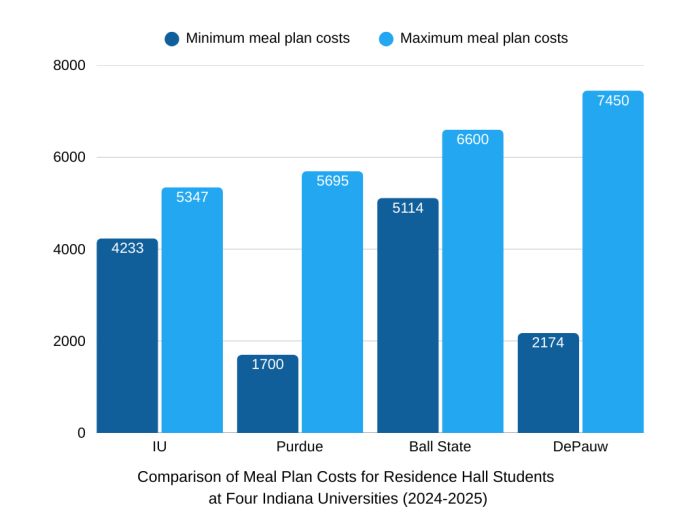
The housing selection process for the 2025-2016 academic year at DePauw University concluded on March 28, but many students voiced frustrations over the mandatory meal plans tied to university-owned housing. With tuition increasing and financial pressures mounting, students are questioning why they must purchase costly meal plans, even if they do not fully utilize them.
Students Express Dissatisfaction
Many students feel that these meal plans impose unnecessary expenses, particularly for those who prefer alternative dining options. As a result, students often seek out alternative housing arrangements, such as Greek housing, duplex apartments or off-campus apartments not owned by DePauw, to avoid the high costs associated with university meal plans.
Le ‘27 emphasized her concerns about meal plan purchases: "Finances are my biggest issue when choosing housing. I like cooking for myself, so paying for a meal plan I rarely use feels like a waste."
Nguyen ‘27 echoed these sentiments: "Because I’m an international student, I already face challenges in securing housing. And we don’t get priority in the housing selection process, making it difficult to obtain a spot in more affordable options like duplex houses. With tuition and fees increasing by 3.8% next year, I need to find ways to cut costs, but the mandatory meal plan limits my ability to do so. I would prefer the flexibility to cook my own meals and better manage my expenses." As a sophomore, Nguyen did not get the priority reserved for upperclassmen in the housing selection process.
A major point of contention is DePauw’s meal plan policy changes that took effect in Fall 2024. In addition to requiring meal plans for all university-owned housing residents, the university has restricted the use of swipes at convenience store to certain “meal alternatives,” limiting students’ ability to buy groceries and snacks with their swipes.
These restrictions have led to further dissatisfaction, as students argue that meal plans should cater to their needs rather than force them into rigid dining structures.
How DePauw Compares to Other Indiana Universities
When looking at meal plan policies at other Indiana universities, DePauw stands out for its higher costs and stricter requirements:
*All statistics cited are sourced from the universities' official websites.
Unlike Indiana University-Bloomington, Purdue University and Ball State University, which allow students in apartments to opt out of meal plans, DePauw mandates meal plans for all students in university-owned housing, regardless of their dining preferences or financial situation.
At DePauw, meal plans range from $7,450 per year for students in traditional residence halls to a minimum of $2,174 for those in university-owned apartments. IU’s meal plans range from $4,233 to $5,347 per year and are only required for dorm residents. Purdue’s plans, while offering a wide range of options, allow apartment residents to opt out, with costs ranging from $1,700 to $5,695. Ball State University also requires meal plans only for freshmen living in residence halls. DePauw’s lack of flexibility places a heavier financial burden on students, particularly those who prefer to cook their own meals or find more affordable dining alternatives.
Meal plan policies should align with DePauw’s broader commitment to independence and equity. If students are trusted to manage their academic workload and finances, they should also be trusted to decide how they nourish themselves.
The rigid meal plan structure exacerbates financial inequality. Many students come from diverse financial backgrounds, and requiring all residents to purchase expensive meal plans places a greater burden on those already struggling with tuition and living expenses. This policy creates an unfair divide between those who can afford dining hall convenience and those seeking more affordable alternatives.
Additionally, the meal plans fail to accommodate students who prefer home-cooked meals for cultural, health or religious reasons. For example, many students find that campus meals lack both cultural authenticity and culinary freshness—meals like rice served with generic stew or recycled pizza made from leftovers fail to represent their culinary traditions or provide enough nutritional value. Similarly, Muslim students who follow halal dietary guidelines frequently encounter limited options. Despite these shortcomings, they are still required to pay thousands of dollars for meal plans they may rarely or never use.
As the debate continues, students hope DePauw will revise its meal plan policies, especially for traditional dorms. A more flexible system would better serve the financial and dietary needs of the student body while still providing dining access for those who need it.
